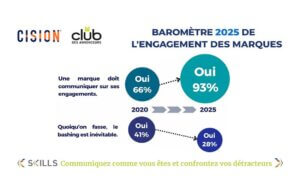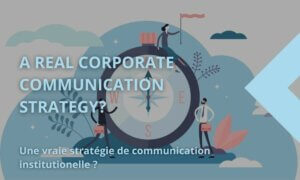The working world is increasingly tense in Western countries.
How can we attract and motivate the younger generation to join the big companies? They want to explore new horizons, are often reluctant to commit to a company, demand meaning and prefer to work remotely, which makes it difficult to reinforce the corporate culture…
Internal communication is becoming even more strategic for team cohesion and the development of motivation and efficiency at work. The effects of post-Covid working practices have yet to be fully measured, but some studies are already pointing to new challenges for companies.
Internal communication needs to reinvent itself and enter a new era to maintain human contact, a factor of cohesion and sense of belonging.
Reversing the order of priorities in internal communications
Very often, communication is understood as the need to transmit information, or even to push through corporate messages. The assumption is that full knowledge of the company’s strategy will give employees a common identity and the necessary sense of belonging.
While it’s true that sharing the company’s successes and strategic ambitions, or celebrating the arrival of new recruits, can be conducive to a better team spirit, this form of internal communication has become secondary to the new challenges of recruiting and retaining talent.
SKILLS believes that internal communication should be built around 3 main pillars: Information, Identity and Commitment, Personal Development. Well-informed employees, with a sense of corporate belonging and a willingness to commit to the causes the company embraces, are the key to greater efficiency and loyalty in the workplace.
Regaining motivation in times of quiet quitting
Younger generations are looking for meaning in their jobs, beyond their day-to-day mission, remuneration or benefits. In many cases, work is not even an end in itself, but a means to self-fulfillment. How, in the current context of “quiet quitting” can we motivate them to stay with the company, to do more than just their job, and even to become leaders in the company’s development? This challenge can be met if we consider the three pillars of internal communication together. Every individual should appreciate the opportunities for personal development offered to them, and the forms of societal commitment proposed by the company to which they can contribute. Would you like to audit the effectiveness of your internal communications with Skills?
In this way, the company must define its mission and the commitments it wants to and can pursue, given its activity. This is the principle of the purpose-driven company recently defined by the Pacte law in France. Of course, these pillars of commitment and personal development won’t be enough to motivate everyone. However, they will convince some employees and generate a ripple effect on the others. Provided, of course, that these commitments are sincere! The company must define them and prepare a long-term progress schedule, in collaboration with all its stakeholders (employees, trade unions, suppliers, NGOs, etc.). This will ensure the credibility of its CSR commitments.

A paradigm shift
Such an approach to internal communication, this time geared towards collaborative exchange with a view to developing a common identity, not around the company’s business strategy, but around its values and mission, constitutes an essential paradigm shift.
This will put the spotlight on achievements and players around the company’s societal commitments. Commercial deals will no longer be at the forefront, unless they serve the company’s mission. In this way, a sense of belonging will be established more quickly, and individual initiative will certainly be encouraged.
Similarly, the personal development modules offered by HR will have to change. They will have to focus not only on ensuring employees’ growth in their technical skills, but also on the areas essential to the company’s corporate social responsibility.
In this context, the experience of SKILLS DirCom can help any company to define the priorities of its mission. This involves identifying the commitment actions to be implemented, motivating an internal network of employees to lead these actions, and setting up communication tools to highlight the internal examples to be followed.
Articles relatifs:
- What if internal communication was all about buy-in?
- The post-containment managerial exercise has become more complicated: Integrate a seconded DirCom to help in this strategic business transition
- Managerial communication: knowing how to turn the corner on telework
- Employer Branding: The Ultimate Weapon for Attracting Talent
- A real institutional communication strategy? Why and how?
- Your corporate purpose can do a lot to you
- CSR Communication: Principles, Plan, and Effective Strategy
- How can you strengthen your employer branding and ensure an attractive image for both future recruits and current employees?
- The difference between mere management and leadership is communication - Winston Churchill
- ESG, when companies become committed investors.






